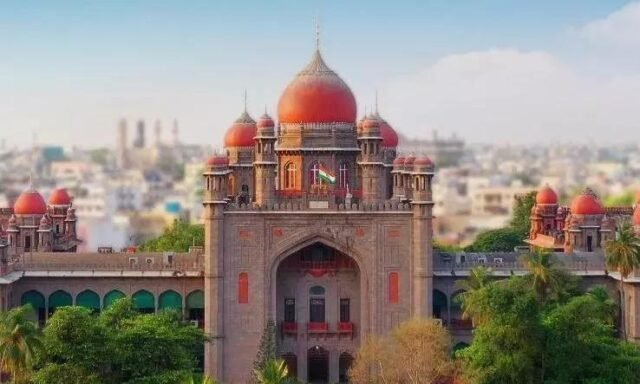Hyderabad: A division bench of Justice Moushumi Bhattacharya and Justice Gadi Praveen Kumar of the Telangana High Court on Monday rejected appeals filed by the state government in relation to 6.22 acres of land that the government had acquired in 2001 for the construction of Silicon Heights at Cyber Park of Manikonda Jagir.
The government had acquired the land in 2001 under the Land Acquisition Act, 1894 under the urgency clause. However, it did not stick to the three-month deadline specified in the 1894 Act and took possession of 2002.
Following a petition by the landowners, a single judge of the High Court had on November 18, 2023, directed the government to allot alternative land within three months to the oustees. If that was not possible, the government should initiate the fresh acquisition proceedings under the Right to Fair Compensation and Transparency in Land Acquisition, Rehabilitation and Resettlement Act, 2013 and conclude the proceedings within three months.
The land is situated in Survey No.s 203/2, 204, 205 and 206/A situated at Silicon Heights, Manikonda Jagir, Rajendranagar mandal of Rangareddy district was purchased by several persons for construction of houses.
As the government had allotted 50 acres of alternative land to TNGO, landowners seeking the same relief had approached the High Court following which the single judge had issued the orders.
Challenging the single judge orders, the Rangareddy district collector filed an appeal requesting the court to condone the delay of 488 days.
The division bench of Justice Moushumi Bhattacharya and Justice Praveen Kumar held that the explanations provided by the state fell far short of the legal threshold under the Limitation Act, 1963, and stressed that government authorities could no longer invoke a presumed privilege to justify extreme procedural delays.
The state argued that the delay in filing the appeals had resulted from the district collector being burdened with responsibilities relating to the November 2023 Assembly elections and later the 2024 Lok Sabha elections, along with implementation of the new government’s flagship programmes after December 2023.
Criticising the stand of the government, the bench observed: “The stand taken by the appellant (district collector) who seeks condonation of delay cannot be born out of privilege and a sense of entitlement.” It stressed that the state cannot claim a “separate period of limitation” merely because the applicant was a government functionary. The judges noted that the collector had access to competent officers familiar with legal procedures and that election duties could not serve as an all-purpose justification to sidestep statutory time limits.
The court underscored the importance of technological capability for government officers. “We are now in 2025. In the light of technological advancement, competence would essentially have to include technology-literate persons who have the wherewithal to remain alive and alert to court proceedings,” the bench observed.
There were procedural lapses in the land acquisition proceedings notification issued on 08.06.2001. Apart from issuing preliminary notification, the government invoked the urgency clause under Section 17(4) of the Act, 1894 the same day. Possession of the subject land was taken on 02.07.2002 and an award was passed on 13.12.2002.
Landowners objected, stating that Section 17(5) of the 1894 Act obliged the government to take possession of the property within three months of invoking the urgency clause. If possession is not taken within the prescribed period, Section 5-A of the 1894 Act would apply, which obligated the government to afford an opportunity of raising objections and conduct an inquiry.







